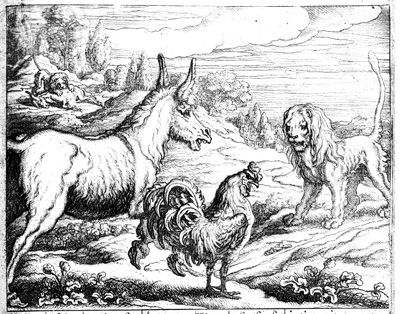Friday Fable: Aesop’s “The Ass, the Cock, and the Lion”*
|
|

Caption: Illustration by Francis Barlow, 1687, with the ass’ fate foretold.
“AN ASS and a Cock were in a straw-yard together when a Lion, desperate from hunger, approached the spot. He was about to spring upon the Ass, when the Cock (to the sound of whose voice the Lion, it is said, has a singular aversion) crowed loudly, and the Lion fled away as fast as he could. The Ass, observing his trepidation at the mere crowing of a Cock summoned courage to attack him, and galloped after him for that purpose. He had run no long distance, when the Lion, turning about, seized him and tore him to pieces.”
“False confidence often leads into danger.”
Or as Sir Roger L'Estrange has it: “The Force of Unaccountable Aversions, is Insuperable. The Fool that is Wise and Brave only in his Own Conceit, runs on without Fear or Wit; but Noise does no Bus'ness.”
And so it is at work. Aesop touches on one of the biggest mistakes an individual or team can make: An overweening optimism.
We humans are just as prone to “false confidence” as is the rooster. This is but one of the biases blighting group work. Like-minded people are especially vulnerable to “group-think” – the failure to hear or respect contrarian views against a dominant opinion, regardless what the data may be showing.
I saw this up close and personal multiple times when I presented findings about student use of the Internet to library groups in the late 90s and early 2000s. As the users’ independent use of e-resources rapidly grew, library services developed for a print-only world dwindled. My research may have been heard but it was not listened to – a few huffed there was no need to innovate or to adapt services - but my predictions pretty much came to be. Eventually, due to pressure from outside, including from with-it library users, waves of emulation - started by a few genuine innovations - soon began to ripple across library-land.
Groupthink can and often does - when the stakes are truly high - propel us toward disaster. Since Aesop’s animals can talk, why does the rooster not warn the ass about his false assumption?
“Come back, you dumb ass! It’s my crowing, not your braying!”
Every group needs at least a few members ready to speak up when over-confidence rears its supercilious head.
*Source: AESOP’S FABLES By Aesop Translated by George Fyler Townsend (probably from this edition): “Three hundred and fifty Aesop’s fables”. Chicago, Belford, Clarke & Co., 1886.
Available at the Gutenberg Project.
Leading from the Middle Library: Swinburne University Library,
Hawthorn, Victoria, Australia.
@Copyright John Lubans 2015
 John Lubans - portrait by WSJ
John Lubans - portrait by WSJ